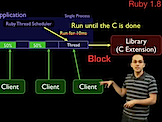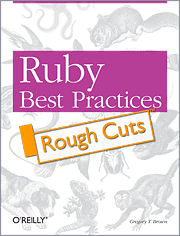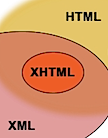 HappyMapper is John Nunemaker’s attempt at “making XML fun again” for Rubyists by providing an object to XML mapping library with a succinct syntax. Essentially, you can use HappyMapper to rapidly turn XML into Ruby objects – even nesting them inside and referring to each other. This is powerful stuff. To install, just gem install happymapper
HappyMapper is John Nunemaker’s attempt at “making XML fun again” for Rubyists by providing an object to XML mapping library with a succinct syntax. Essentially, you can use HappyMapper to rapidly turn XML into Ruby objects – even nesting them inside and referring to each other. This is powerful stuff. To install, just gem install happymapper
John’s own examples are powerful demonstrations of how it works, so check them out. The first is parsing the XML returned from Twitter. The statues and associated users in that XML can be processed (with the relationship maintained) with the following code:
class User
include HappyMapper
element :id, Integer
element :name, String
element :screen_name, String
element :location, String
element :description, String
element :profile_image_url, String
element :url, String
element :protected, Boolean
element :followers_count, Integer
end
class Status
include HappyMapper
element :id, Integer
element :text, String
element :created_at, Time
element :source, String
element :truncated, Boolean
element :in_reply_to_status_id, Integer
element :in_reply_to_user_id, Integer
element :favorited, Boolean
has_one :user, User
end
statuses = Status.parse(xml_string)
statuses.each do |status|
puts status.user.name, status.user.screen_name, status.text, status.source, ”
end
Added: Or.. Read More







 Testing is a firmly ingrained part of the Ruby culture: you probably ran across
Testing is a firmly ingrained part of the Ruby culture: you probably ran across  Earlier this month,
Earlier this month, 
 When you want your objects to refer to / have associations with other objects, it can quickly become a complex procedure. Ryan Daigle to the rescue! Ryan has built
When you want your objects to refer to / have associations with other objects, it can quickly become a complex procedure. Ryan Daigle to the rescue! Ryan has built 
 We’ve all heard the admonitions: “Don’t Repeat Yourself!” But how do you avoid this if you’re working on a Ruby codebase that stretches to thousands of lines, maintained by multiple developers? One answer is to run a tool that looks for duplicate code. This is an area where good tools are tantalizingly close – there are at least three out there that are worth checking out:
We’ve all heard the admonitions: “Don’t Repeat Yourself!” But how do you avoid this if you’re working on a Ruby codebase that stretches to thousands of lines, maintained by multiple developers? One answer is to run a tool that looks for duplicate code. This is an area where good tools are tantalizingly close – there are at least three out there that are worth checking out:


 Yesterday, Aaron Patterson (
Yesterday, Aaron Patterson ( What’s Hot on
What’s Hot on  In
In 